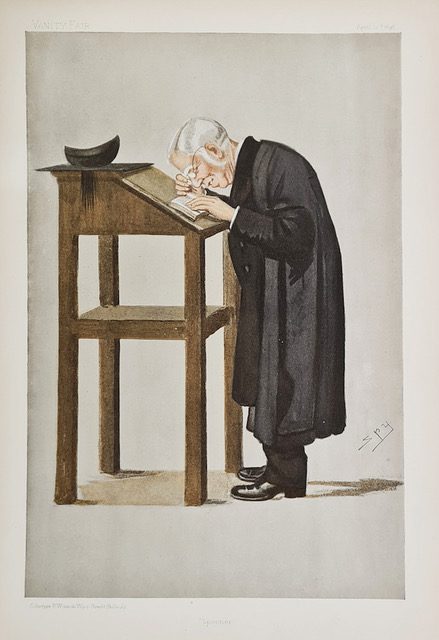JMS Pearce
Hull, England

The name of the Rev. William Archibald Spooner (1844–1930), warden of New College Oxford 1903–24, is preserved, some would say hallowed, for his involuntary invention of a verbal curiosity. Many found it amusing and the eponym Spoonerism came into colloquial use in Oxford from about 1885.
Spoonerisms are the accidental transpositions of the initial sounds, or other parts, of two or more words.1 They are often used for comedic effect in literature, jokes, and wordplay. Medical examples, many probably invented, include sick-lick vomiting (cyclical vomiting), sick as hell anemia (sickle cell anemia), and a bottle in front of me (frontal lobotomy). Essentially, Spoonerisms resemble what lexicographers call metaplasms, a transformation of letters or syllables in single words; or metatheses, when letters are transposed in a word and removed from their proper places. Typically, both metathesis and metaplasm apply to changes within a single word, rather than to transpositions between two words, which are the common basis of Spoonerisms.2
An alternative term was called Marrowskying, recordedin the 1859 edition of A Dictionary of Modern Slang, Cant, and Vulgar Words by JC Hotten. It was a variety of slang, or a slip in speech, characterized by transposition of initial letters, syllables, or parts of two words so that a mutton chop becomes a “chutton mop,” or a pint of stout a “stint of pout.” Hotten also mentioned Medical Greek, the slang used by medical students at the hospitals, and Gower-street Dialect. In the British Medical Journal of 22 June 1912 appeared:
THE PSYCHOLOGY OF “MARROWSKYING”
All actors live in dread of “marrowskying,” that curious transposition of syllables which often illustrates the truth of the saying that from the sublime to the ridiculous there is but a step. The actor who said, “Stand back, my lord, and let the parson cough” (instead of “coffin pass”) may have made a solitary slip, but in some persons “marrowskying” amounts to a veritable infirmity.
By 1923, Spoonerisms were fashionable sources of fun. Aldous Huxley wrote in Antic Hay xx. 284:
When pain and anguish wring the brow, an interesting mangle thou, as we used to say in the good old days when the pun and the Spoonerisms were in fashion.
Some questionably attributed to Spooner:
It is kisstomary to cuss the bride (It is customary to kiss the bride).
Yes indeed, the Lord is a shoving leopard (loving shepherd).
Is the bean dizzy? (Is the Dean busy?)
The weight of rages (rate of wages) will press hard upon the employer.
Did Spooner actually speak in this way? The answer according to contemporaries is yes, but rarely. As a rule, the more ridiculous the Spoonerism, the more likely its playful invention by undergraduates. Sir Ernest Barker (Age and Youth, 1953) commented, “[Spooner] was seldom guilty of metaphasis or the transposition of sounds.” They are mentioned only twice in his diaries, and he disliked his reputation for them. Spooner also was prone to absent-mindedness and amusing “slips of action.”3
How this started, we do not know for certain. Did Spooner talk in this fashion from his childhood? Was it always accidental? This verbal idiosyncrasy has been erroneously considered a form of dysgraphia, yet dysgraphia applies to the written word.
Spooner was born on 22 July 1844 to William and Jane Lydia Spooner.4 His father was a county court judge, described by Spooner as self-indulgent. He attended the grammar school at Oswestry and became the first scholar not to have attended Winchester School when he entered New College Oxford. He was a keen rower and received a First in Classical Honour Moderations in 1864, and a First in Classics in 1866. He was then elected a Fellow of College and in turn was lecturer, tutor, dean, and in 1903, warden.
His academic work in classical history was highly regarded. He became chaplain to the Archbishop of Canterbury in 1878 and was examining chaplain to the Bishop of Peterborough. A generous, tolerant man, he was very shortsighted as shown in the Spy print. But for his rare verbal quirks, his name would probably be long forgotten.
References
- Potter JM. Dr Spooner and his dysgraphia. Proc R Soc Med 1976;69:639-48.
- Aronson J. Medical Greek. British Medical Journal. 1998;316:845.
- Anderson-Talbi S. William Archibald Spooner and his Spoonerisms. New College Notes 2017;8.
- Hayter W. Spooner: A Biography. London: WH Allen, 1977.
JMS PEARCE is a retired neurologist and author with a particular interest in the history of medicine and science.

Leave a Reply